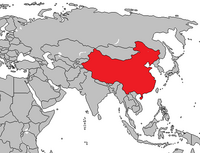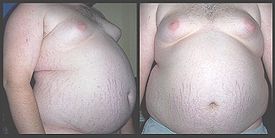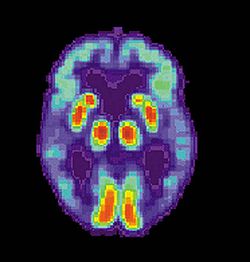Atheism and sedentary lifestyles

The journal article Spirituality and Physical Activity and Sedentary Behavior among Latino Men and Women in Massachusetts which was published in the journal Ethnicity and Disease declared: "There is a significant negative relationship between spirituality and sedentary behavior."[2] See also: Atheism and physical fitness
In addition, numerous studies report that athletes to be more religious than non-athletes.[3] See also: Sports performance: Religious faith vs. atheism
Sedentary lifestyles reduce life expectancy.[4] Religion/spirituality is positively correlated to greater longevity (see: Atheism and life expectancy).
Contents
Irreligion/nonreligious regions and sedentary behavior
The current atheist population mostly resides in East Asia (particularly China) and in secular Europe/Australia among whites.[5] See: Western atheism and race and Atheist population and Global atheism
East Asian atheists and sedentary lifestyles
See also: Asian atheism and China and atheism

Razib Khan points out in Discover Magazine, "most secular nations in the world are those of East Asia, in particular what are often termed 'Confucian societies'. It is likely therefore that the majority of the world’s atheists are actually East Asian."[7]
China has the world's largest atheist population.[8][9] See also: China and atheism
China Daily reported in 2017:
| “ | IN ONE PREFECTURE-LEVEL CITY nearly 57 percent of those applying to join the armed forces have failed their health test so far this year. Beijing Youth Daily commented on Monday:
That so many potential recruits failed the fitness test reveals the worrying fact that unhealthy lifestyles have taken a toll on many Chinese youngsters.[10] |
” |
The Journal of Sport and Health Science reported in 2016:
| “ | Three decades of open reforms in China have brought significant changes in industrialization and urbanization, which have begun to exert an impact on the living environment, health care, and lifestyles. The unprecedented economic development has also brought with it an increase in both the burden of noncommunicable diseases (e.g., coronary heart disease, stroke, hypertension, cancer, and type 2 diabetes) and unhealthy lifestyles (e.g., physical inactivity, fatty food intake, and smoking) among the Chinese population. Physical inactivity, which has been recognized as a high risk factor for disease—contributing 12%–19% of the risk associated with major noncommunicable diseases — has been on the rise in China and was responsible for at least 15% of health care-related costs of major diseases in 2007. This situation has created an urgent need for primary prevention efforts aimed at promoting an active lifestyle, including physical activity (PA), and preventing noncommunicable diseases among the aging Chinese population.[11] | ” |
Secular Europe and sedentary lifestyles

In 2019, the World Health Organization (WHO) declared:
| “ | In the WHO European Region, one in five people takes little or no physical activity, with higher levels of inactivity in eastern countries. In the European Union (EU), two thirds of the adult population does not reach recommended levels of activity. As a result, physical inactivity is estimated to deprive Europeans of over 8 million days of healthy life every year, on average. Everybody is not affected in the same way, however.
Maintaining sufficient levels of physical activity is becoming more and more difficult, as most daily environments have changed significantly in recent years. The causes of physical inactivity are predominantly the result of systemic and environmental factors, which have made daily living and working environments increasingly sedentary. Greater distances between homes, workplaces, shops and places for leisure activities have increased the use of cars and led to a decline in walking and cycling. Simultaneously, in many contexts, road safety remains a concern, whereby it is, or is perceived to be, not safe to engage in active transport. Children and adolescents spend more time in school or day-care settings than ever before; academic demands are increasing, which can reduce the time dedicated to physical education and active play. [13] |
” |
Australia and sedentary lifestyles
See also: Irreligion in Australia

After WWII, Australia has become a very secular country.[15]
According to the Sydney Morning Herald:
| “ | Australia is one of the least devout countries in the Western world, although two-thirds of its population identifies itself as Christian, an international survey comparing religious expression in 21 countries has found.
Religion does not play a central part in the lives of many Australians: 48 per cent of Australians surveyed said they did not partake in personal prayer and 52 per cent said they rarely attended a place of worship for religious reasons.[16] |
” |
According to the Heart Foundation, Australia:
| “ | In 2014/15, 65.3% of Australians aged 15 and over were sedentary or had low levels of exercise (comprised of 33.8% sedentary and 31.5% low levels of exercise).
In total, 12 million Australians aged 15 and over had either sedentary or low levels of exercise.[17] |
” |
Atheism, obesity and sedentary lifestyles
See also: Atheism and obesity

Two of the major risk factors for becoming obese according to the Mayo Clinic are poor dietary choices and inactivity.[19]
Secular Europe and communist China have significant problems with obesity (see: Secular Europe and obesity and China and obesity). In addition, Australia has a significant problem with obesity (see: Australia, irreligion and obesity).
In the United States at the present time, the greater the degree of irreligiosity in a generation, the higher their obesity rate is. According to the Gallup Inc., "Very religious Americans are more likely to practice healthy behaviors than those who are moderately religious or nonreligious."[20]
Internet atheism and obesity
See also: Internet atheism

Overweight individuals may need to decrease their computer and internet usage.[22]
In an essay entitled How the Atheist Movement Failed Me, an atheist woman noted that participation in the atheist community is often expensive due to the cost of attending atheist conferences and even local atheist meetings in restaurants and bars challenged her modest budget.[23] As a result of the challenges that atheists often have in terms of socializing with each other in person, many atheists turn to the internet in terms of communicating with other atheists.[24] Recently, a few atheist churches have sprung up, but CNN reported that there are questions on whether this movement can last due to an internal schism within the movement (See also: Atheist factions).[25] CNN also poses the question: "Is disbelief enough to keep a Sunday gathering together?".[26]
In 2009, an Australian university study was done concerning the association between leisure time internet and computer use with being overweight/obese and also sedentary.[27] The study concluded: "These findings suggest that, apart from nutritional and physical activity interventions, it may also be necessary to decrease time spent in sedentary behaviors, such as leisure-time Internet and computer use, in order to reduce the prevalence of overweight and obesity."[28]
In 2013, the prominent atheist PZ Myers declared:
| “ | If we're going to expand our base and we're going to draw in more people to recognize the virtues of living in a secular world, we need to appeal to more than just that geek and nerd subset of the population. We need to have a wider base. ...I seriously believe that we're on the cusp of a crisis. We're not there yet but it's looming in front of us. Will we adapt and thrive and change the world? Or will we remain an avocation for a prosperous and largely irrelevant subset of the population? Will we become something more than a scattered society of internet nerds? That's what we have to do.[29] | ” |
Internet nerds are typically less active in sports. As noted above, atheists are not as active in sports as theists. And inactivity is a major risk factor for obesity.
Irreligion, video gaming and obesity
See also: Irreligion, video game usage and obesity and Video game usage and excess weight

There is social science research showing a positive correlation between video game usage and excess weight (see: Video game usage and excess weight).
Relevant Magazine reported about the journal article in The International Journal for the Psychology of Religion entitled No Other Gods Before Mario?: Game Preferences Among Atheistic and Religious Individuals:
| “ | A new study of 228 college students found that while just about everyone prefers video games to regular board games (duh), those who claim no religion vastly prefer video games compared to the religious peers. It's a small study, but the director, Chris Burris, has an interesting hypothesis about why atheists prefer video games. Burris believes that atheists tend to be less good at "generating emotionally evocative internal simulations of experience." Simply put, he believes that religious people tend to be more imaginative, and are able to craft their own sense of play around simple games, while non-religious people tend to prefer the concrete rules afforded by video games.[31] | ” |
See also: Atheism and emotional/intrapersonal intelligence
Atheist Stephen Fry on video gaming
The atheist Stephen Fry said, "I do enjoy video gaming... In the early days of games, I would spend hours. I mean literally. I would find it would be 4am and I would say God I have be at work at 6."[32]
Atheism, type 2 diabetes and sedentary behavior
See also: Atheism and diabetes
Medical scientists have established that increasing physical activity plays an important role in reducing the risk of obesity and type 2 diabetes.[33]
Irreligious/nonrelgious regions of the world have significant problems with diabetes (see: Atheism and diabetes).
Atheism, Alzheimer's disease and sedentary lifestyles

See also: Atheism and Alzheimer's disease
In 2017, Medical News Today reported that "For older adults, a lack of exercise may put their risk of developing dementia on par with that of adults who are genetically predisposed to the disease. This is the conclusion of a new study published in the Journal of Alzheimer's Disease."[34]
In irreligious/nonreligious regions, there is a significant amount of Alzheimer's disease (see: Irreligious/nonreligious geographic regions and Alzheimer's disease).
Diet, exercise, obesity, the degree of alcohol consumption, various spiritual practices and various other health practices are linked to the development and/or progression of Alzheimer's disease (see: Religion and Alzheimer's disease prevention).[35][36]
For more information about religion/atheism and various health practices, please see: Atheism and Alzheimer's disease.
Sloth in atheistic communist countries vs. Protestant work ethic
See also: Atheism and sloth and Protestant Ethic and the Spirit of Capitalism and Atheism and economic prosperity

Atheism is a part of Marxist-Leninist and Maoist/Chinese communist ideology (See: Atheism and communism).
Widespread sloth in the former Soviet Union helped cause much poverty.[38][39] A study performed in the former Soviet Union found that over 50% of the work force admitted to drinking alcohol while on the job (See also: Atheism and alcoholism).[40] In the former Soviet Union, a popular joke was that the workers pretended to work and the Soviet Union pretended to pay them.[41]
In 1982, the website Foreign Affairs indicated about the Soviet Union and food production:
| “ | What has changed during these two decades? How is it possible that the Soviet Union has almost exactly the same area of arable and permanent crop land per head of the population as has the United States, namely 0.89 hectares (2.2 acres), and cannot feed its population adequately, whereas U.S. agriculture not only supplies the population with one of the richest diets in the world but in addition supplies more food for export than any other country?[42] | ” |
On the other hand, the atheist and Harvard University historian Niall Ferguson declared: "Through a mixture of hard work and thrift the Protestant societies of the North and West Atlantic achieved the most rapid economic growth in history."[43]
In China, the growth in religion has accompanied China’s fast economic growth over the last twenty years.[44] Christianity is seeing rapid growth in China and the historian Niall Ferguson attributes this recent economic growth to the Protestant work ethic being more incorporated into Chinese society.[45] See also: Protestant work ethic and Growth of Christianity in China
Protestant work ethic statistics
Protestant missionaries and economic development statistic

The article The Surprising Discovery About Those Colonialist, Proselytizing Missionaries published in Christianity Today notes:
| “ | In his fifth year of graduate school, Woodberry created a statistical model that could test the connection between missionary work and the health of nations. He and a few research assistants spent two years coding data and refining their methods. They hoped to compute the lasting effect of missionaries, on average, worldwide...
One morning, in a windowless, dusty computer lab lit by fluorescent bulbs, Woodberry ran the first big test. After he finished prepping the statistical program on his computer, he clicked "Enter" and then leaned forward to read the results. "I was shocked," says Woodberry. "It was like an atomic bomb. The impact of missions on global democracy was huge. I kept adding variables to the model—factors that people had been studying and writing about for the past 40 years—and they all got wiped out. It was amazing. I knew, then, I was on to something really important." Woodberry already had historical proof that missionaries had educated women and the poor, promoted widespread printing, led nationalist movements that empowered ordinary citizens, and fueled other key elements of democracy. Now the statistics were backing it up: Missionaries weren't just part of the picture. They were central to it... Areas where Protestant missionaries had a significant presence in the past are on average more economically developed today, with comparatively better health, lower infant mortality, lower corruption, greater literacy, higher educational attainment (especially for women), and more robust membership in nongovernmental associations. In short: Want a blossoming democracy today? The solution is simple—if you have a time machine: Send a 19th-century missionary."[47] |
” |
Protestant work ethic and China: Additional information
According to Slate, "Protestant Christianity has been the fastest growing religion in China."[49] Evangelical Christianity is especially growing sharply in China.[50]
Hugh Whelchel's article The Protestant Work Ethic: Alive & Well…In China declares:
| “ | Christianity has exploded in China over the last twenty years. A 2011 report from the BBC conservatively estimated there were 60 million Christians in China. Small, primarily Protestant “house churches” are especially having a strong impact on the country.
This growth in religion has accompanied China’s rapid economic growth over the last twenty years. Now the world’s 2nd largest economy, China illustrates how even a limited amount of economic freedom has the power to lift millions of Chinese out of abject poverty and build one of the strongest economies in the world. Ferguson suggests that China is starting to supplant the West, but is doing it by becoming more Western. China is booting up several of Ferguson’s “killer apps” – especially the Protestant Work Ethic.[51] |
” |
Protestantism and the Eurozone crisis
A 2011 Telegraph article said about the Eurozone Crisis: "Either way, not a single Protestant or Germanic EU country has so far needed a bailout."[52]
See also
References
- ↑ Strength of Religious Faith of Athletes and Nonathletes at Two NCAA Division III Institutions
- ↑ Spirituality and Physical Activity and Sedentary Behavior among Latino Men and Women in Massachusetts by Valerie J. Silfee, Christina F. Haughton, Stephenie C. Lemon, Vilma Lora, and Milagros C. Rosal, Ethnicity and Disease. 2017 Winter; 27(1): 3–10. Published online 2017 Jan 19. doi: 10.18865/ed.27.1.3
- ↑ Strength of Religious Faith of Athletes and Nonathletes at Two NCAA Division III Institutions
- ↑ Height and Weight May Determine How Long You Can Live—Especially If You're a Woman
- ↑ A surprising map of where the world’s atheists live, By Max Fisher and Caitlin Dewey, Washington Post, May 23, 2013
- ↑ Sedentary lives make many unfit for service, China Daily, 2017
- ↑ Most atheists are not white & other non-fairy tales, Discover magazine
- ↑ Top 50 Countries With Highest Proportion of Atheists / Agnostics (Zuckerman, 2005)
- ↑ A surprising map of where the world’s atheists live, Washington Post By Max Fisher and Caitlin Dewey May 23, 2013
- ↑ Sedentary lives make many unfit for service, China Daily, 2017
- ↑ Physical activity among older Chinese adults living in urban and rural areas: A review by Wenfei Zhu, Aiping Chi Yuliang Sun, Journal of Sport and Health Science Volume 5, Issue 3, September 2016, Pages 281-286
- ↑ Europe and sedentary lifestyles, World Health Organization, accessed 3-27-2019
- ↑ Europe and sedentary lifestyles, World Health Organization, accessed 3-27-2019
- ↑ Heart Foundation Australia - Level of exercise statistics
- ↑ Stephanie Painter, Vivienne Ryan and Bethany Hiatt, (15 June 2010). "Australians losing the faith". Newspaper. West Australian Newspapers Ltd. Retrieved 15 June 2010
- ↑ God's OK, it's just the religion bit we don't like
- ↑ Heart Foundation Australia - Level of exercise statistics
- ↑
- Causes of obesity - Mayo Clinic
- How much exercise is needed to get fit and lose weight
- Genes Are Not Destiny - Harvard University School of Public health
- The 6 Weight-Loss Tips That Science Actually Knows Work - Forbes, April 9, 2013
- Long-term weight loss maintenance, American Journal of Clinical Nutrition, 2005 July; 82(1 Suppl):222S-225S.
- Strength Training For Weight Loss Success by Deborah L. Mullen, CSCS
- Weight loss strategies for success - Mayo Clinic
- ↑ Causes of obesity
- ↑ Very Religious Americans Lead Healthier Lives, Gallup Poll, 2010
- ↑ Long-term weight loss maintenance, American Journal of Clinical Nutrition, 2005 July; 82(1 Suppl):222S-225S.
- ↑ http://www.jmir.org/2009/3/e28/
- ↑ How the Atheist Movement Failed Me – Part 1: Cost
- ↑ How to outlaw Christianity by Chuck Norris
- ↑ After a schism, a question: Can atheist churches last? By Katie Engelhart, special to CNNJanuary 4th, 2014
- ↑ After a schism, a question: Can atheist churches last? By Katie Engelhart, special to CNNJanuary 4th, 2014
- ↑ http://www.jmir.org/2009/3/e28/
- ↑ http://www.jmir.org/2009/3/e28/
- ↑ in Seattle, PZ Myers Reflects Candidly on His Constituency
- ↑ Stephen Fry talks gaming
- ↑ Why Do Atheists Like Video Games More Than Religious People Do?, Relevant Magazine
- ↑ Stephen Fry talks gaming
- ↑ Sedentary lifestyle and risk of obesity and type 2 diabetes, Hu FB, Lipids. 2003 Feb;38(2):103-8.
- ↑ Sedentary behavior raises dementia risk as much as genetic factors, Medical News Today, 2017
- ↑ Obesity + aging linked to Alzheimer's markers in the brain, Science Daily, June 28, 2018
- ↑ Obesity as a risk factor for Alzheimer's disease: weighing the evidence. by Alford S, Patel D, Perakakis N, Mantzoros CS., Obesity Reviews. 2018 Feb;19(2):269-280. doi: 10.1111/obr.12629. Epub 2017 Oct 10.
- ↑ You Pretend to work and Putin pretends to pay you
- ↑ Poverty, prostitutes and the long, slow death of the Soviet Union: Haunting pictures show desperate struggle to survive in last days of USSR, The Daily Mail
- ↑ Soviet Openness Brings Poverty Out of the Shadows, New York Times
- ↑ Communism and computer ethics
- ↑ You Pretend to work and Putin pretends to pay you
- ↑ Soviet Agriculture's Dependence on the West By Karl-Eugen Wädekin, Foreign Affairs, 1982
- ↑ The Protestant Work Ethic: Alive & Well…In China By Hugh Whelchel on September 24, 2012
- ↑ The Protestant Work Ethic: Alive & Well…In China By Hugh Whelchel on September 24, 2012
- ↑ The Protestant Work Ethic: Alive & Well…In China By Hugh Whelchel on September 24, 2012
- ↑ The Protestant Work Ethic: Alive & Well…In China By Hugh Whelchel on September 24, 2012
- ↑ Christianity Today, The Surprising Discovery About Those Colonialist, Proselytizing Missionaries, January 8, 2014
- ↑ The Protestant Work Ethic: Alive & Well…In China By Hugh Whelchel on September 24, 2012
- ↑ When Will China Become the World’s Largest Christian Country?, Slate
- ↑ In China, a church-state showdown of biblical proportions
- ↑ The Protestant Work Ethic: Alive & Well…In China by Hugh Whelchel
- ↑ Yet another country needs a bailout from the Protestant North
